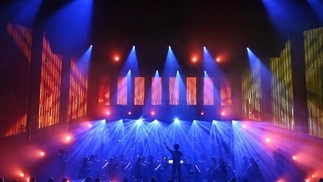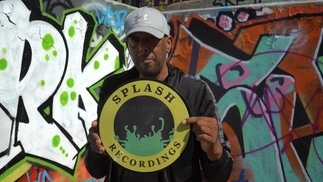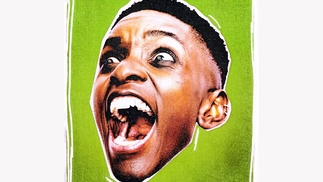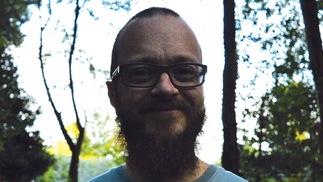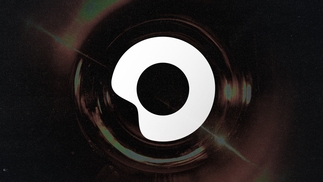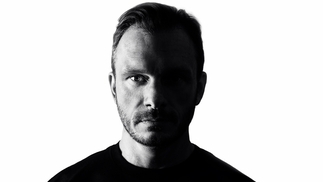ANDY C: BY THE HORNS
Andy C explains how he's always kept the faith with drum & bass...
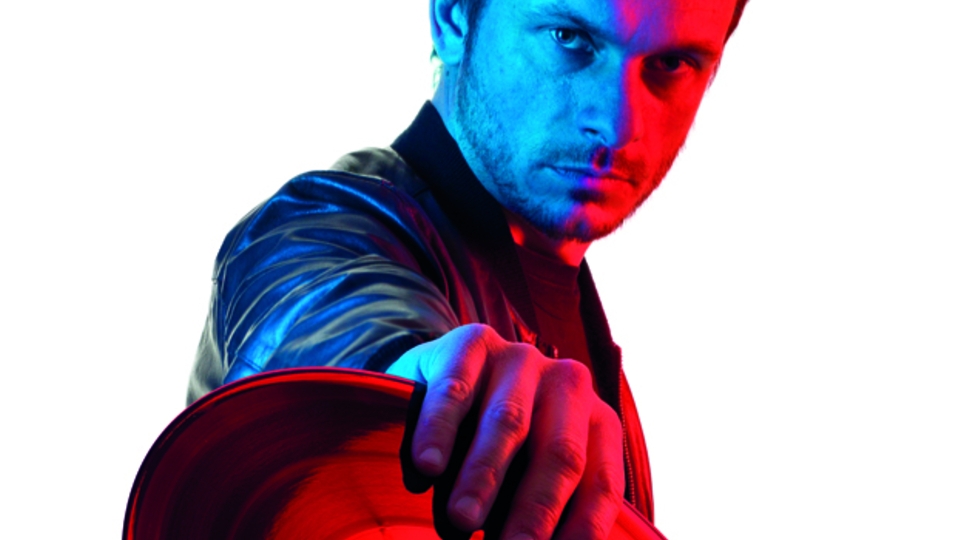
“When you’re drum & bass, you really are — you get it, and there’s nothing else like it. You can’t get assimilated into 4/4, your tempo doesn’t fit in with other genres — it is what it is, and the uniqueness of it is why it’s still around. That’s a big contributing factor in its longevity.”
“We’re so proud of what Ram's achieved so far. We’ve got a big staff of people, everybody’s pulling in, really cares. We’re proud of where we have pushed it to, but I think it’s got a lot more legs — I really do. And I’m so confident in what the artists are making.”
Right out at the most eastern point of the London tube network — past Barking, Dagenham and West Ham — lies the nondescript Ram Records HQ. It's in the area where DJ Andy C grew up — Hornchurch/Upminster in Essex — and couldn't really be in a less glamorous location if it tried. Above a slightly rundown pub near the tube station lies a '70s-style office that reminds DJ Mag a little bit of The Office in Ricky Gervais's acclaimed sitcom. It's a world away from trendy office spaces in east London or wherever, but for one of the most successful independent record labels in the UK that doesn't matter one iota.
Walking through the main room to the partitioned-off office space by the far wall, various Ram employees are beavering away and we're greeted by Andy himself and business partner Scott, the MD of Ram who gave Andy his first proper DJ gig back in the day. Andy's in a chipper mood, despite being a bit jet-lagged, and — although we've met him many times — we immediately ask Andy how he got his nickname The Executioner.
“It comes from my good good friend MC GQ,” he says, chuckling. “We’d be on the road... I always like to hit the ground running when I play, I’m not really one to ease myself into a set — it’s like ‘Let’s ‘ave it!’ from the off — and I dunno, I guess GQ just said it one night. It’s quite a funny old name, but for some bizarre reason it’s really resonated. I don’t call myself it...” He starts laughing about having a hood and a big axe...
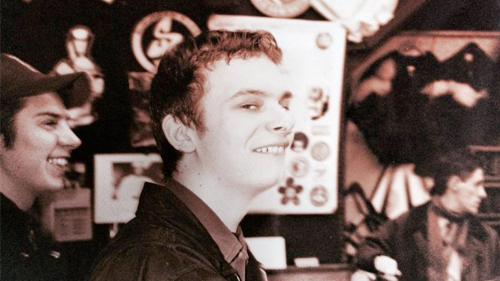
HARDCORE DAYS
Through his older sister, Andrew Clarke stated listening to pirate radio stations like Sunrise and Centreforce when he was barely into his teens. “I was the annoying younger brother who wanted to go out,” he grins. “I used to get up before school to listen to the stations, and me and my mate James used to pretend to do radio shows, recording them and getting into the music.”
His sister took him to an illegal rave just down the road, and he had the time of his life. “And that was it — from that moment, that’s all I wanted to do,” he says. “I didn’t actually go to another rave after that until I was 15, and doing work experience in Hornchurch with Scott, who’s now my manager.”
He tells the story of how he was put together with Scott Bourne, aka Red One, who was working at the Nat West bank in Hornchurch in 1991 — “I had a placement there cos I think they did the best hours” — and putting on the Imagination raves in Bishopsgate in his spare time. “It was fate,” he says. “That was my first experience of being in a rave all night. He charged me to get in though, the cheeky sod!”
Witnessing a DJ called Just Jones from Syndicate FM drive the crowd crazy, Andy thought “That’s what I want to do!”, and got hold of a cheap pair of decks. “I used to practice like crazy, it’s all I used to do morning, noon and night,” he raves. “I’d get in from school and mix all night, have a few hours sleep, get up, go to school. I used to do mixtapes for me mates at school, and I came up with all kinds of stupid DJ names, like DJ Mono... I can’t really remember, all the clichés.
“People would have all the coolest names like ‘Grooverider’, people you looked up to, and I was on the phone to Scott, and he was doing a gig in a club called The Prison in Stoke Newington and said, ‘I’m doing the flyer, can I have a name?’ ‘Now!?’ And I’m saying all these names, and he’s saying ‘That’s rubbish, that’s rubbish’, and then he says ‘Andy C – call yourself that’. I was like, ‘I dunno, I’m not really comfortable with it’, and he’s like ‘I’m doing it. Bye!’ Brrrrrrrr. And he put the phone down. So that was that.”
After that gig, Scott sent out one of Andy's mixtapes to various promoters, and Elevation booked him for Club Dada on Shaftesbury Avenue. “I played before The Ratpack, which was a very big deal for me then,” Andy recalls. “I guess I held my own, and that gave me a lot of confidence.”
As well as DJing, Andy had a Commodore 64 computer that he did a bit of programming on as well as played games, and soon he hooked up with local pal Ant Miles, and together they made shuffly hardcore hip-house tune ‘Turn On’ under the name Desired State. Throughout 1991 and '92 they released a few hardcore tunes on labels like Karma, Dance Wax, Strategy and Out of Romford Records, and meantime Andy was working on a solo project which became the 'Sour Mash EP'. He describes the laborious process of recording a monophonic track on a Fostex 16-track recorder, and how he wanted to put it out on his own.
“Because Ant and I had had some bad experiences of not being paid and not being in control of the music, Sarah [his sister] and I were sitting down having dinner at home one night and she said, ‘Why don’t you just start a record label?’” he recounts. “I thought, ‘You can’t just start a record label, you need corporate headquarters and business cards and all that kind of stuff’.”
But his sister convinced him. “She said, ‘You’re an Aries, why don’t you call it Ram?’ At the time it was just a conduit to put a tune out that I didn’t want to get knocked on. Sarah drew the logo on white paper and I put it in an A4 envelope, sent it off to get the labels printed up in London, went on holiday to Majorca, and when I came back the record was pressed. It was like, ‘Hey presto’.”

RAM JAMS
So just after finishing his GCSEs in 1992, Ram Records was launched. Him and Ant pretty soon got jobs with a distributor called Jump Start Records. “I didn’t have a driving license at the time — I was 16 — and Ant did, so basically he drove and I sold,” Andy remembers. “We used to drive up to London to Music Power, Boogie Times, Unity, Black Market, all them stores, and he’d pull up, I’d jump out the back of the car, and we worked for Jump Start — selling.
At the same time, I could sell my own tune — not without them knowing, I’d still have to pay the distributor for that! But we was just on a wage for distributing, as well as doing the tunes at the same time.”
He borrowed a grand from his uncle to start Ram, and sold 1500 of the 'Sour Mash EP' really quickly and was able to pay his uncle back straight away. “My dad was massively encouraging, saying ‘Why not give it a go?’ whereas my mum was like, ‘That’s not a job!’” he recalls. “I was 16, I’d only just left school, and I wasn’t going to uni or college or anything like that, so I was like ‘What have I got to lose?’
“They were mad times back then,” he continues. “I basically lived in Boogie Times [record shop], I used to finish school, jump on me BMX and ride down to Boogie Times in Romford. I’d hang out, annoy them probably, pick up all the flyers...”
He tells how he didn't realise that Boogie Times was basically the Suburban Base shop, and that he'd be in there asking for tunes such as Sonz of A Loop Da Loop Era ‘Far Out’, “and it turns out I’m asking Danny Breaks for his own tunes, cos he was Sonz of A Loop... I never put two and two together, but basically all the guys down there — Winston, Danny, Dave who did the artwork, Danny Donnelly obviously... what a label it was, a huge inspiration.”
Andy raves about how Saturdays at Boogie Times would literally be like a packed rave. “Summertimes were fantastic, everyone would be coming in for flyers, making plans about what rave they was gonna go to that night,” he enthuses. “I was in there so much that they was like, ‘You know what? You might as well come and help us behind the counter’. That was really exciting, cos you’re on the spot in a record shop. I treated it like it was a DJ set, I wasn’t just playing records, I was mixing cos I just love mixing, and I just used to mix for as long as I could until they got the hump and Danny come back on the decks — cos everybody used to have a go.”
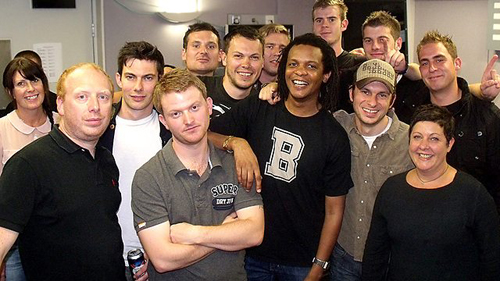
VALLEY OF THE SHADOWS
One day, Andy and Ant made a tune that was a bit different from their normal fare — more shuffly, linear and with a phuturistic steppa vibe. Ant added a sample from a woman in a BBC documentary talking about near-death experiences — “I was in this long dark tunnel” – and also snippets of moon landing astronaut commentary — “31 seconds”. They recorded it in four hours and called it 'Valley of the Shadows' (and themselves Origin Unknown), but it didn’t sound like much else that was around. Andy took it down to Boogie Times to play it to the guys there, and they said they preferred the other new track of theirs – 'The Touch' — so they made 'Shadows' the B-side.
“I remember driving down to PR Records in Wimbledon with Ant to pick up the ‘Bass Logic EP’, which was Ram 003, a solo EP by myself, and ‘Valley of the Shadows’, which was Ram 004,” Andy says. “We picked them up, and I rang the distributor and said, ‘I’ve just picked them up and I’m bringing 1000 copies of each’, and he said ‘You’ve got to press some more ‘Valley of the Shadows’, it’s gone crazy, I need another 3000 by Thursday’. I was like ‘What?’
“The tune comes out, and the week after that it was like ‘I need another 3000, I need another 3000, I need another 5000... literally, the phone would ring, and me and Ant would laugh cos we’d say, ‘I bet that’s the distributor’. It was before caller ID – ha ha — and it just snowballed. It wasn’t like today where hype builds on tunes before, it all happened after it was released.”
The guys hadn't done any pre-release promo, and Ram 002 — the 'Eastern Promise EP' hadn't even come out properly — but now Ram, and Andy, were firmly on the map.
Andy believes that the fact that he was on the delivery runs and meeting everybody face-to-face all the time definitely helped with his integration into the emerging jungle/drum & bass scene. “I was selling records to the shops, giving records out to the DJs, going to Black Market and cutting Ray Keith and Nicky Blackmarket a dubplate of the remix, or being at Music House and cutting dubs,” he says. “It was more face-to-face, there wasn’t a confusion factor between being Origin Unknown and Andy C.”
Ant didn't want to do any Origin Unknown gigs, so Andy did a string of 'live' PAs. “I used to go out with me long hair with a keyboard not plugged in, power lead gaffer-taped to the back of the keyboard, and be on the road doing all these performances to a DAT,” he recalls. “I did a fair few — Laserdrome, Roller Express, Birmingham... crazy memories.”
One night he'd be hanging out with legendary jungle spinner Randall at AWOL, the next night he'd be flying to Japan as Moving Shadow's new resident DJ. “I’m 17 or 18 and this huge record label suddenly says, ‘Do you wanna be our DJ?’” he says. “They used to do Voodoo Magic at Equinox in Leicester Square, and one night Rob Playford is like, ‘You’re playing two o’clock, after LTJ Bukem’. 'What!?' That was a big deal, and I went on and it was just good times. From then on, if a rave organisation makes this statement and are putting me on, people are like ‘Who’s this kid?’ If you grab your chance, one thing leads onto another.”
VERY IMPORTANT PLATES
One thing did indeed lead to another. By the mid-'90s he was doing the rounds with Hype and Brockie, scooting around London record shops like Section 5, Black Market and Lucky Spin to pick up DATs from producers and cutting dubs down Music House on Holloway Road.
He starts talking about the importance of Music House to the scene in the '90s, about how a lot of big tunes emanated from there, and how producers would only let a certain number of DJs cut their new tracks to plate — and how hype would build from there. “Music House was a mission, it would take up all day until the early hours,” he remembers. “Bless the guys who were cutting down there — Paul and Leon and Chris, they used to stay up until late, man. There’d be everyone eating their dinner in there, and drinks coming out — it was great, good fun. And then Groove and Goldie and all that would come down for a big Blue Note session and lock the building off, and you’d sit there wanting to cut these brilliant tunes. Good times, man.”
Andy admits that there was a spell in the mid-'90s where the Ram catalogue was quite sporadic, with only a few releases per year. “We were having a good time for sure, but we kind of focused on remixes,” he says. He and Ant then knuckled down and made a couple of Origin Unknown albums, and then they teamed with another local boy, Shimon, to form Ram Trilogy and released the 'Molten Beats' album in 1999.
Drum & bass had exploded into the mainstream by this time, but was co-opted too much — the sound started getting used on TV adverts and all sorts — and as a reaction the sound got darker as tech-step took over, and pre-Millennial paranoia infected the productions of some producers. The raves and record sales remained as healthy as ever, despite the media writing off drum & bass, and just after the Millennium it was buoyant once again — evidenced by Andy's huge track with Shimon. The triple-time 'Body Rock' sold 38,000 pieces of vinyl in the UK — just in chart-registered shops alone.
“Yeah, we got to No.28 in the charts, but we didn't then think, ‘Now let’s make chart hits’, cos if you listen to that record I don’t think you’d have thought, ‘That’s a guaranteed daytime radio chart record’,” he smirks. “It was just another one of them things that really caught people’s imaginations.”
He talks about the first time he played 'Body Rock' out, at the after-party at Bar Rumba in Shaftesbury Avenue following the Drum & Bass Awards and then at Homelands, and realised it was big. Other tunes followed in its wake, but during the alleged d&b 'downturn' Andy remembers people trying to convince him to switch genres.
“Other scenes would come around and people would say to me, ‘That drum & bass thing, are you sure? You’re gonna go down with it’,” he says. “Someone said that to me once. ‘Jump off that sinking ship’, and this was somebody whose opinion would matter, but I was like ‘No way mate’. Even more, it galvanises you.
When you’re drum & bass, you really are — you get it, and there’s nothing else like it. You can’t get assimilated into 4/4, your tempo doesn’t fit in with other genres — it is what it is, and the uniqueness of it is why it’s still around. That’s a big contributing factor in its longevity.”
He talks proudly about the self-sustaining nature of drum & bass's tight-knit independent networks. “It’s not going anywhere,” he says. “If something’s been around for as long as we have... the scene’s not falling off a cliff tomorrow.
We are a foundation, a standard of music, and we’ve been on a massive upward curve for the past few years. People come back to it — always. ‘Do you know what? I wanna go to a drum & bass rave, cos I haven’t been to one for a while and I really miss that energy’. They catch you playing in a tent somewhere and think, ‘Oh my god, yeah!’ There’s a few big tunes that really resonate with people, and everybody gets pulled back in again.”

AWARDS
For the past 15 years, Andy's been winning awards as a DJ. It started with Best DJ at The Knowledge D&B Awards in the late '90s, and has included Highest Drum & Bass DJ at numerous DJ Mag Top 100 DJs Awards. DJ Mag jokes with Andy about his groaning mantlepiece, yet there was an extent at festivals where d&b DJs would always be playing in a tent — never on the main stage. Andy's ALIVE show concept was designed to change this.
Hooking up with technicians from Green Hippo and Featureworks, he developed a bespoke show involving cutting-edge audio-visual technology and Traktor-powered turntables that use time-coded vinyl.
It was a massive learning curve — a whole computer language called Boolean was programmed into his equipment — but it appealed to his inner geek to learn new tricks. “On Allen & Heath's DB4 [mixer] you have five buttons on each channel and each of them have Midimaps to do a specific visual or a specific effect,” he explains. “And then I had the Ableton 64-button thing, and that was triggering off visuals in-sync with whatever pitch my decks were at... it was really cool. It’s interesting to know how much of that technical hardship was translated onto the crowd. I know that the enjoyment factor was there, cos you could see people enjoying themselves.
“I had a Lighting Designer there, but all of my stuff would over-ride that and cut in,” he continues. “I’ve had some of the companies that were involved ringing me up saying, ‘You know when you did that ALIVE thing, can you tell us what you did cos we can’t work it out!?’ They’ve got DJs that want to tour and want to do it now. Apparently some DJs want to do a little bit more stuff in real time now.”
He talks about the journey involved on a personal level from conception to realisation of ALIVE, and how good it was travelling around festivals with a crew. “Such a good bunch of guys, we had some amazing times, none more so than Vegas — and at festivals in the UK,” Andy says. “It was just really cool. Dan the roadie, John tour manager, Rhodri LD, Simon, Nigel, and Scott overseeing the whole thing. And you can play to the big crowds. My main thing with drum & bass has been, ‘Give us a chance, put us in front of a big crowd and we’ll entertain people’, cos it’s that kind of music.”
Andy says he was grateful to promoters who took a chance with him on the main stage, and that he hasn't done ALIVE for nearly two years now.
“We had a really good run, and you can’t do it all the time because of the factors involved,” he says. “Getting a couple of tons of equipment around everywhere and having the guys on the road everyday — fed, transport, hotels, it’s no small undertaking.
“Am I going to do it again? Maybe, when and if the time is right. I’d have to have a big upgrade and change it, just on a personal level, but it’s in storage at the moment somewhere — mothballed. It was a brilliant experience. It was a really nice way to interact with the crowd — just me, the music and the visuals which I was controlling.”
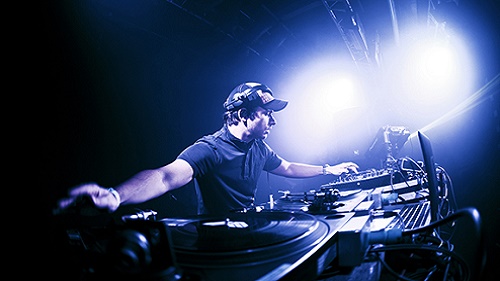
CHALLENGES
As a DJ today, Andy is busier than ever. He's just back from a Russian jaunt when we catch up with him, and is off to practically any country you can name at some point this year.
How does he find the time to A&R all these artists (like Chase & Status and Sub Focus — see side panel — and all the other Ram acts profiled on the following few pages), assemble his next genre-spanning 'Nightlife' mix comp, put on Ram nights, write tunes himself, and then go and DJ somewhere every weekend, DJ Mag asks? “This is my life, isn’t it?” he says.
“I love it. It’s what you do — you find the time. You work hard. I love a challenge, I love setting goals, and I love the feeling of when we are able to achieve these goals as a record label.
“But it’s still like a hobby to me in a way, it’s one of them things like when I was at home when I was 15 mixing in my bedroom, dreaming of being able to do it in front of a crowd, learning how to manufacture a record, finding out the company that prints records, finding out how you put a record label on a record, thinking it’s some smoke and mirrors magical process... everything is like that, so we set goals.
It’s like a mad hobby that’s turned into a profession, and we’re now really fortunate to be in a position where we can dream ideas, and set goals to try to realise them. That’s the fun part of it.”
The one element that has suffered over the past few years, as the label activity and DJ bookings went through the roof, is Andy making tunes himself, but this is something he's been working hard to rectify recently.
“I’d say that when the end of the analogue era of producing came, a lot of people disappeared — from all genres,” he reckons. “It was such a sea-change in how you make stuff, it was like literally going back to school and re-learning, and if you didn’t then this whole new wave of producers come through and you can’t sound anything like it. So to go in and learn that whole thing again was a big process.”
He remixed old pals Chase & Status and also Major Lazer, and had the 'Workout/Haunting' double-header out towards the end of last year.
“That was a novelty, having a tune out that got played on the radio for the first time in a decade,” he says. “You can make the best album in the world in your head, you’ve just got to realise them ideas — which is the hard part.”
“Am I working on an album? I’m working on tunes,” he says, slightly warily. “It’s the kiss of death if you say you are — for me, anyway.
I’m enjoying making tunes, I’ve got a few made at the moment, I was able to play ‘em at the weekend and they sounded good. I’m just enjoying making them, so we’ll see. I’m working on a batch of tunes at the moment.”
Andy's label Ram is 22-years-old now, but despite its success — chart hits, No.1 albums and so forth — there's a sense in which they've only just begun.
“We’re so proud of what we’ve achieved so far,” Andy says. “We’ve got a big staff of people, everybody’s pulling in, really cares.
We’re proud of where we have pushed it to, but I think it’s got a lot more legs — I really do. And I’m so confident in what the artists are making.”
OTHER RAM SUCCESS STORIES
“The great thing about it is that we’re still massively involved with both Chase & Status and Sub Focus. We’ve got all the Chase & Status gold discs with the Ram logo, we’re still involved. The guys want to fly, let’s reach for the stars together. We’re manufacturing Nick’s new single at the moment. Their stuff is licensed. It’s been a really good journey to go through together.”
ANDY C ON: CHASE & STATUS
“Scott [Bourne, Ram MD] and I had a meeting in about 2004, and we said ‘We can’t keep putting out drum & bass 12s, there’s got to be more to the music — in an album sense. Letting artists express themselves’. Chase & Status had been around for a while on various labels, with a really fantastic track history of music, so Scott was like ‘Let’s call ‘em up’.
“We had a meeting, and it turns out that they were big fans of us, as well as us being big fans of them. The meeting went well, and we were both on the same page in terms of ambition. In fact, what Saul said at that first meeting — what they wanted to achieve — they’ve absolutely done everything, every single one of those aims.
Probably quicker than what he said. At the meeting I was like, ‘That’s some bold ambitions there’, but you know what? Fair play to the guys, they’re bloody hard working — really cool guys. It was a great journey to go on with them, the project really caught fire.”
ANDY C ON: SUB FOCUS
“His mate Jack gave me a demo CD when I was playing at this club in Maidenhead. We just found it the other day, actually, in the stock room. In marker pen it had written on it ‘Sub Focus’ and then a phone number, and you couldn’t read the last number.
I’m like ‘This demo is amazing’, so I’m sitting down in my old place on the floor — cos I didn’t have any sofas at the time — and for one, I couldn’t even read what he’d written, ‘Sub Focus’, cos his handwriting leaves a lot to be desired. And then with the number I’m like, ‘OK, dot-dot-dot... zero. Brrrrrrrr. Dot-dot-dot... one’. And finally I got the number, I think it was a five or six on the end.
“So I rang him up, and he didn’t believe it was me, he didn’t know his mate had given me the CD, and by that time we’d been around for a few years and he thought I was joking. And what can I say? We put out two of them tunes on Frequency, our sister label at the time, as a test-bed without any alterations whatsoever, and then Nick [Sub Focus] did another few demos that were a little bit crazy, not quite right, and then in the old office he came down for a meeting and brought ‘X-Ray’ and ‘Scarecrow’. ‘And ‘X-Ray’ was his take-off tune, the one everybody went absolutely nuts for.
“Sub Focus really did explode, the economy of music and proper quality, he always puts just what he needs to put in the tunes, really memorable. He doesn't throw the kitchen sink at it.”
